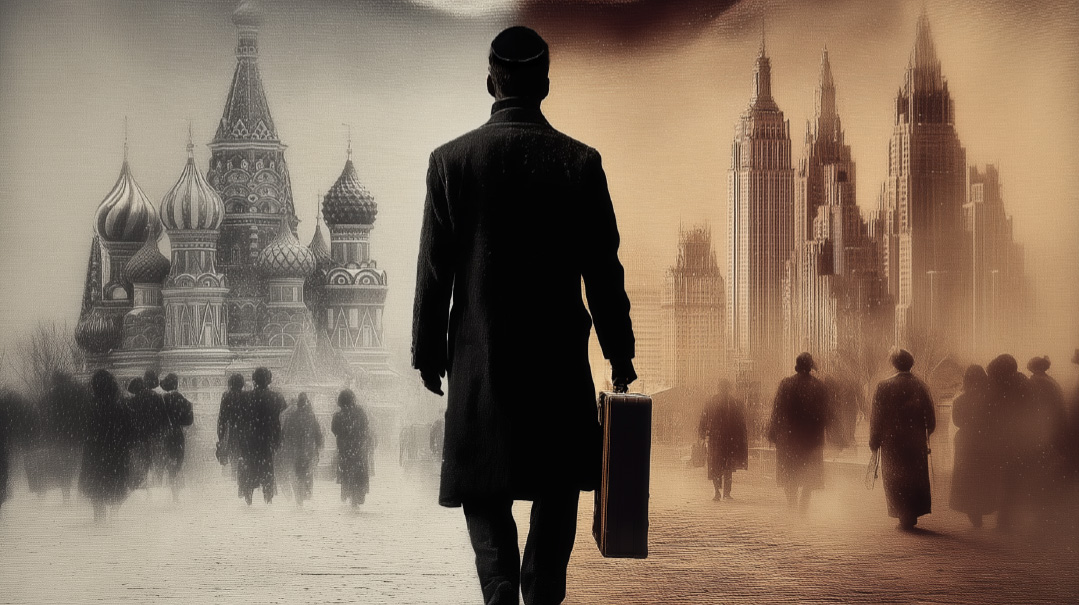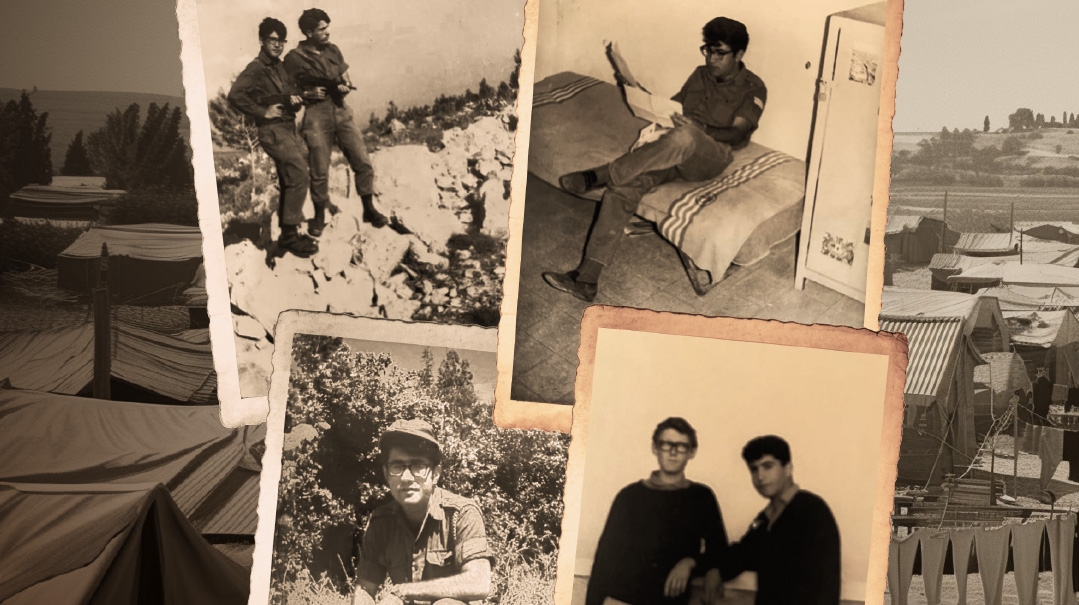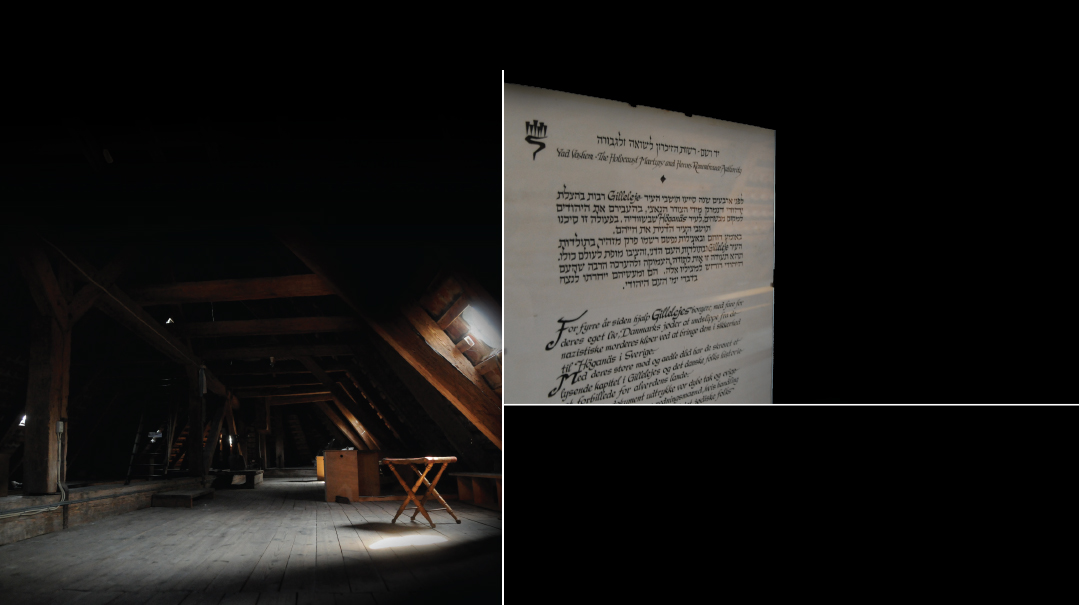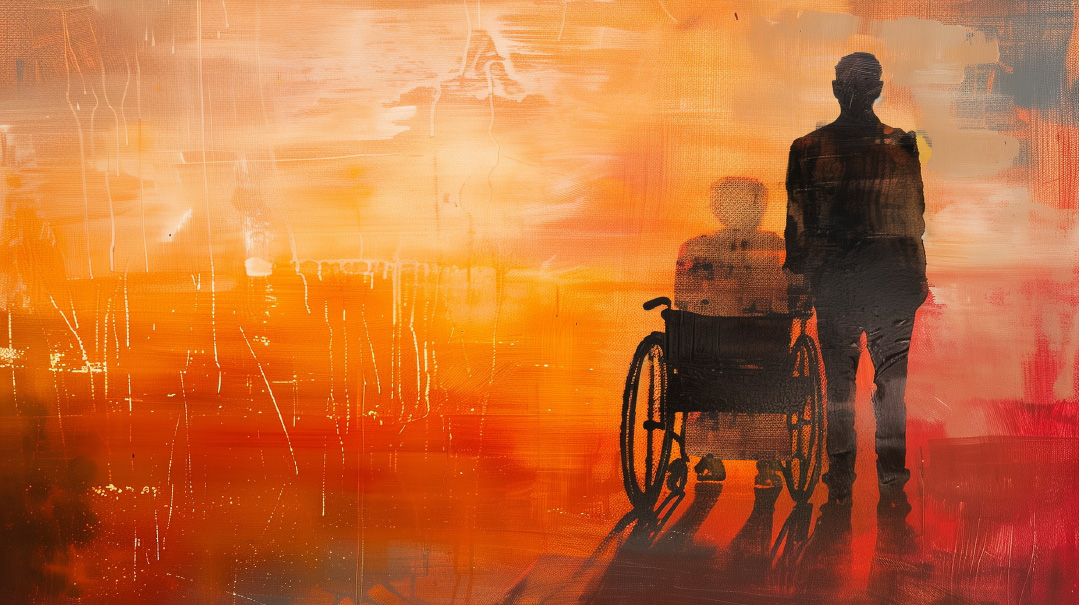Never ever alone
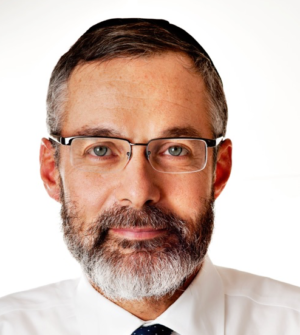
An incredible saga. A medical miracle. A true account in 8 chapters
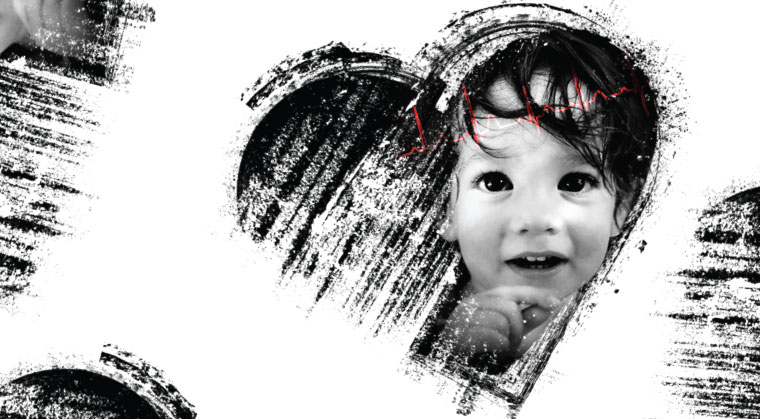
Chapter 1 Pre-Bris Jitters
“Something’s wrong with the baby.” It was just a few days after my son’s birth in Jerusalem at the very end of 1992. The bris planning was well underway — hall caterer photographer and sandek… my rebbi.
But my wife Chana insisted that we couldn’t do the bris. She had a feeling that the baby wasn’t well. We went through a checklist: pulse normal nursing okay muscle tone good pupil dilation. (My wife had long taken an interest in informal medical study.)
“So what makes you think there’s something wrong?” I asked.
“I just have this feeling ” she answered.
“Should we go check the baby out in the ER? They’ll catch whatever it is.”
“No ” she said. “But we can’t do the bris.”
Beginning to feel a certain anxiety myself I called my sister’s husband Jules Gardin a very famous cardiologist in New York. I told him really nothing was wrong with the baby but Chana was having pre-bris jitters. He asked to speak to her. I could hear only her half of the conversation which basically amounted to her insistence that something was wrong.
Jules then told me “Listen you cannot give a bris milah to a child whose mother is panicked. It’s not nice! You gotta calm her down.”
He advised me to call a friend of his Dr. Dan Tzivoni the head of cardiology at Shaare Zedek. He would check the baby and give the thumbs-up to proceed with the bris.
We bundled up the baby and shot over to the hospital in a cab making our way to the cardiac unit on the fifth floor. The secretary there stubbornly refused to let us see Dr. Tzivoni and offered an appointment in 90 days. When I mentioned Jules’s name the recalcitrance in her eyes thawed by one degree; she went into the back of the office and two minutes later a man in a white coat came out.
“What are you doing here?” he asked.
“It’s my baby ” I said gesturing behind me to Chana who was clutching the child.
He took one look at Chana’s face and called out “Orderly! Give that baby an echocardiogram!”
Another guy in a white coat nearby grabbed the baby like a football and took off down the hall. Dan Tzivoni went running back to his office. We went in pursuit of our child.
We got to the door of a room filled with physicians. Our baby was on the table being poked and prodded with jelly on his belly and his heartbeat displayed on a big screen: tha-thump tha-thump. Chana and I stood in the hall watching.
“How are we going to get a well baby checkup?” Chana wondered.
“Don’t worry ” I reassured her “when they’re done in there they have to show that test to Dan Tzivoni and we’ll explain that it was a mistake we just wanted a well baby checkup and he’ll tell us what’s going on.”
After 45 minutes they finally flipped off the machine all but one of the doctors filed out and he invited us in to sit down. He rolled his chair over and closed the door.
“Mr. and Mrs. Kelemen your baby should be dead ” he informed us.
“He has dozens of holes in his heart, and he has a blocked aorta. The only reason he’s alive is because of a fluke — the ductus arteriosus, an artery that is normally only open in utero and closes after delivery with the baby’s first breath, didn’t close for him.”
The doctor, a pediatric cardiologist, explained that while the ductus arteriosus was open, the baby was able to have something approximating normal circulation. But this artery was designed to close upon exposure to oxygen.
“Eventually it’s going to close,” the pediatric cardiologist said, “and then your baby is going to die.”
I asked about surgery, but the doctor explained that no surgeon in Israel would touch this case because the outcome was a foregone conclusion: “These kids never make it.”
When I insisted that we would do whatever necessary to save our son’s life, the pediatric cardiologist relented a bit and said there were three doctors in the world who might be willing to perform an experimental procedure — one in Boston, one in New York, and the best one, Dr. Hillel Laks, in my hometown of Los Angeles.
In the meantime, however, we faced a roadblock that was all but insurmountable: Our infant son, in order to survive even the next few minutes, would need to be placed in a special incubator that strictly regulated his oxygen intake, to prevent triggering the closure of his ductus arteriosus. This incubator was not transportable. When I asked if it came in a mobile version, the doctor said yes — but not in Israel.
Even if we were somehow able to obtain this mobile incubator from another country, he said, we would face a new obstacle: the passenger cabin of a jetliner is pressurized with a very high-density oxygen atmosphere. Were our son to get one whiff of that air, it would kill him. To keep him alive, his incubator would have to be sealed, airtight, and receive a special feed from a dedicated low-density oxygen tank.
To complicate matters even further, the Federal Aviation Administration had enacted a rule forbidding planes from entering US airspace with such customized oxygen tanks on board. A couple of years before, a plane had lost air pressure in the cabin, and a passenger’s oxygen tank exploded.
“Therefore, Mr. Kelemen,” the doctor concluded grimly, “you are not going anyplace.”
A cold reality began to sink in. I asked what we should do now.
He said we could accompany the staff to put our son in the hospital’s special incubator in the pediatric ICU. I held my little boy’s head for over an hour, while they inserted tubes in through his head, one by one. Then they took him and settled his tiny form down in the incubator, sealed it, and that was it. At the top of the incubator was a little window, through which we could see a shadow of a child.
The head of the pediatric ICU approached us and suggested it might be a good time to call a rabbi. I had never been through the death of someone this close to me before, and I had no idea how I was going to react. He handed me a slip with a name and phone number and said, “Call this rabbi.”
It was 12:30 at night. Chana and I walked out into a hallway and found a phone. I then saw that this number was for a rabbi in Bnei Brak. I figured he must be an expert at counseling people facing very serious situations like this. Amazingly, a secretary answered the phone, and put me on with this rabbi.
“Hello, this is Rabbi Firer. How can I help you?”
I explained we were calling from Shaare Zedek in Jerusalem, where the doctors had just informed us that our newborn son’s heart was full of holes, and his aorta was blocked.
“Hmm… multiple VSDs and a coarc.”
After a pause, he pronounced that our baby needed emergency surgery, but no surgeon in Israel would do it — possibly a doctor in Boston, or in New York, but our best hope lay with Dr. Hillel Laks in Los Angeles. Before I could register amazement at his expertise, he went on to list all the complications involved with flying our little patient to California — starting with the lack of a mobile incubator in Israel.
“There is a mobile incubator in France,” Rabbi Firer said. “I think I can get it to Jerusalem by tomorrow night. You’ll be able to fly out then.”
He advised that he did not have a solution for the oxygen, but in the meantime he would work on the incubator. Then I heard the dial tone.
I put down the phone, and Chana asked, “What happened?”
All I could say was, “I don’t know!”
Chapter 2 Every Minute Is Crucial
When I explained Rabbi Firer’s plan to the head of the pediatric ICU, he shook his head. “This is going to cost you tens of thousands of dollars, and these kids never live. Don’t do this, Mr. Kelemen.”
But my wife and I looked at each other and saw the conviction mirrored in our eyes.
The doctor capitulated, but then brought up an important point: Given the amount of equipment we’d have to fly with, we’d probably need the whole back row of seats in a 747. If we were to fly out the next night, we’d need to check ticket availability immediately.
It was one in the morning when I phoned my travel agent, Sossi Abramowitz (a.k.a. “the Angel”). The urgency in my voice brought her out of her sleep. I detailed the entire situation for her, from my newborn son’s diagnosis up through Rabbi Firer’s plan — to the part where Sossi could help. I explained the problems with the oxygen, and the back row of the 747. She told me to stand by and wait for her call.
About 45 minutes later Sossi reported, “Leib, I got you back rows on two 747s.”
She recounted her negotiation with El Al, who offered to fly us on a 747 leaving Tel Aviv at 1 a.m. for New York; we’d have to find our own connection to Los Angeles. “However, when you land in New York, someone is going to see the oxygen tank, and you’re going to be in trouble.” El Al declared they would assume no responsibility for that: We could bring the tank on board, but the airline would tell the FAA we smuggled it on without their knowledge, and we, not the airline, would have to pay the resulting $50,000 fine.
I had been learning in kollel for about ten years, so my heavenly bank account was better endowed than my earthly one. I nevertheless assented to El Al’s offer.
But there was another dilemma to contend with. Sossi the Angel explained that if we took the El Al flight — which fit best with Rabbi Firer’s plan — we’d be not just fined, but arrested in New York, and our child would never make it to the surgery in Los Angeles. Besides, which domestic US airline would consent to bring the oxygen tank for the final leg of the trip?
So Sossi had found us a second option: a direct Tel Aviv–Los Angeles flight on Swissair, leaving 12 hours later than the El Al flight. (This was the other 747.) This would take us straight to our destination, and although we’d be arrested, at least our baby would arrive in L.A. and have a chance at his lifesaving operation. The hitch, of course, was the departure time 12 hours later — when every minute was crucial.
When Sossi asked which one to book, I couldn’t decide, and asked that she hold both reservations for us. She agreed.
We went back to the pediatric ICU head to present our options, but he introduced a new wrinkle: Shaare Zedek would not release the baby unless we found a qualified cardiologist willing to accompany us on the flight to handle any emergency that might arise. They offered to help us find someone. We agreed, thanked them, and bade them good night.
Chapter 3 The Tiniest Diplomat
When we got home at 2:30, Chana collapsed with exhaustion. I couldn’t sleep a wink. So when the phone rang at three, I sprang to take the call. I heard a woman barking a series of instructions.
She turned out to be the chief administrator at the Ministry of the Interior. In all the commotion, it hadn’t occurred to me that our baby would need a passport. She offered to personally prepare one for us, but we had to appear at her office at 7:30 a.m., one hour before opening time. She listed all the documents we needed to bring, but admonished us to be on time because she had to leave promptly at 8:30 for a meeting in Tel Aviv.
Before she hung up, I managed to ask how she had found out about our situation. She responded as if it were the most obvious thing in the world: “Senator Moynihan told me.”
I just thanked her profusely and promised to show up at 7:30.
I caught a cat-nap after that, but got up with Chana at 5:30 to race over in a taxi to Shaare Zedek. As we entered the pediatric ICU, we were intercepted by the department head who had helped us the night before.
“Mr. Kelemen, you’re a very lucky man.” He recounted that after we had left, they replayed the echocardiogram, and saw that with every beat of our child’s heart, his ductus arteriosus had been closing. They’d started him on prostaglandin IVs, which froze the ductus arteriosus in a half-open position. The baby was at that moment in critical condition, but stable.
We sat there with our baby in his big box until 7:10 a.m., when we had to leave to get the passport. When we arrived at the Misrad Hapnim, the doors were chained closed, but the guard posted out front asked if we were the Kelemens.
“She’s waiting for you, third floor, first door to the left,” he said.
We found her sitting at her desk, puffing away on a cigarette.
“Quickly, come in, come in, we’ve got no time!” she said. She took our papers and gave us forms to fill out, working frantically until suddenly at 7:50 she said, “Give me the birth certificate from the hospital!”
I riffled through the entire file once, then searched again page by page, as this woman got more and more nervous.
“Give me the certificate of live birth! We have to get on with this!”
My eyes were blurring after only two and a half hours of sleep, so I handed the file over to Chana. She went through the file twice and whispered to me, “Leib, it’s not here!”
I took the file and just dumped everything out onto her desk. As we sifted through everything once again, my mind was racing — What did I do with it? I put my head down. Then it hit me. I announced, “It’s in my kid’s file in Shaare Zedek, call them, they’ve got it.”
The woman leaned back in her chair and said, “I’m sorry, Mr. Kelemen, I can’t help you.”
I said, “What are you talking about? Call them up and they’ll tell you they’ve got the certificate of live birth! They can fax it to you!”
“Mr. Kelemen, I have to see the original,” she insisted. “I told you to bring all the papers. I have to see it, I’m sorry.”
I leaned over and said, “Do you understand that if you fail to issue this passport, you’re killing my kid?”
She looked straight back at me and replied, matter-of-factly, “Mr. Kelemen, I told you to bring all your papers.”
It was absolutely useless talking to her. The clock read eight minutes to eight; she would be leaving at 8:30.
I said, “Chana, let’s go.”
The woman emphasized once again that she was leaving at 8:30, and I assured her we’d be back in time.
We bolted out the door. Chana, who had just had a C-section, said, “There’s no time for the elevator!” and started running down the stairs. When we got to the bottom, she cried, “If there isn’t a taxi outside, we’re finished!”
Just then, a taxi pulled up to let out a passenger. Chana and I jumped in. I said to the driver, “Quick! Shaare Zedek!”
The guy looked over his shoulder and saw my wife. He jammed down the gas and used both sides of the road all the way to Shaare Zedek, screeching to a halt in front of the emergency entrance.
I hopped out and told Chana to stay in the cab. As I ran through the door, the driver got out of the taxi and screamed after me, “No! Your wife! Your wife!”
I raced up five flights of stairs and through the halls to the PICU front desk, grabbed the first doctor I saw and said, “Quick! I’ve gotta have my baby’s birth certificate!”
This guy put his arm around me and said, “Shhh… Come with me.”
And he escorted me to just outside the entrance to the ward, and said, “Mr. Kelemen, do you see these doctors over here?” He indicated a crowd of men. “These doctors are visiting from abroad. They should be done in about an hour, and we’ll be with you then.”
He entered the ward, closed the door, and locked it.
Oops! We could not locate your form.








